- Jefferson College is a student-centered comprehensive community college, committed to providing an accessible, quality college experience as it strives to meet the diverse needs of the students and the community. Superior teaching and services foster a supportive learning environment, which promotes intellectual, social, and personal growth. A strong general education curriculum, college transfer and technical programs, personal enrichment courses, and on-campus experiences prepare students to succeed in their careers, further their education, and prosper in a diverse world. Jefferson College’s ongoing assessment of students, programs and services assures that it is a responsive and progressive community college.
School Highlights
Jefferson College serves 4,358 students (43% of students are full-time).
The college's student:teacher ratio of 13:1 is lower than the state community college average of 16:1.
Minority enrollment is 12% of the student body (majority Hispanic and Black), which is less than the state average of 41%.
Quick Stats (2025)
- Enrollment: 4,358 students
- In-state tuition: $3,504
- Out-state tuition: $4,656
- Student:teacher ratio: 13:1
- Minority enrollment: 12%
- Source: Integrated Postsecondary Education Data System (IPEDS)
Top Rankings
Jefferson College ranks among the top 20% of public schools in Missouri for:
Category
Attribute
Affordability
Debt For Students
School Overview
The teacher population of 329 teachers has stayed relatively flat over five years.
Jefferson College
(MO) Community College Avg.
Carnegie Classification
Associate's Colleges: Mixed Transfer/Career & Technical-High Traditional
Baccalaureate Colleges: Diverse Fields
Institution Level
At least 2 but less than 4 years
At least 2 but less than 4 years
Institution Control
Public
Public
Total Faculty
329 staff
139 staff
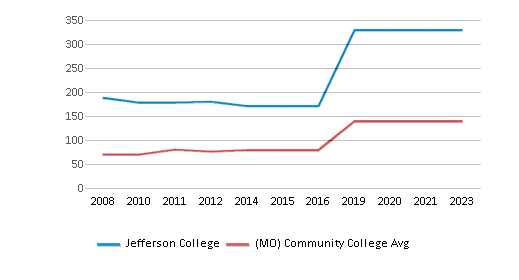
School Calendar
Student Body
The student population of Jefferson College has stayed relatively flat over five years.
The student:teacher ratio of 13:1 has increased from 11:1 over five years.
The Jefferson College diversity score of 0.22 is less than the state average of 0.61. The school's diversity has grown by 29% over five years.
Total Enrollment
4,358 students
1,159 students
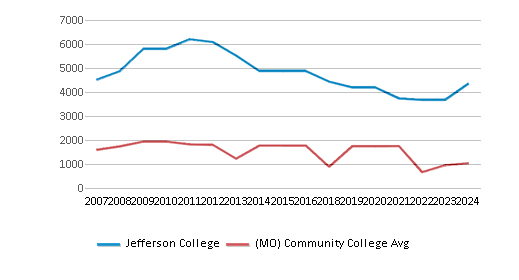
Student : Teacher Ratio
13:1
16:1
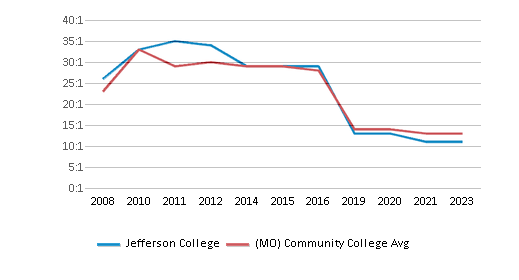
# Full-Time Students
1,876 students
718 students
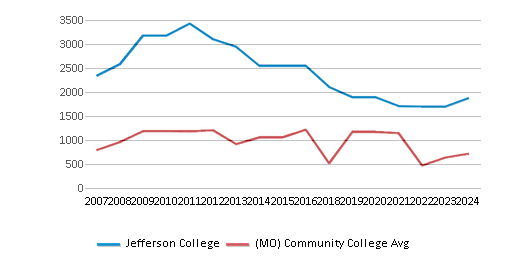
# Part-Time Students
2,482 students
1,407 students
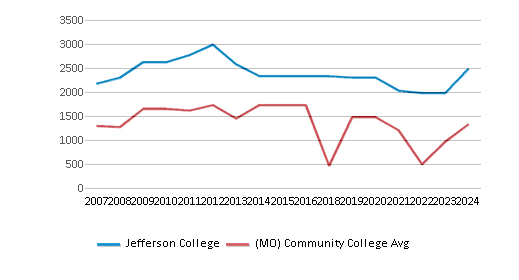
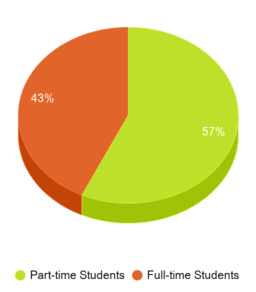
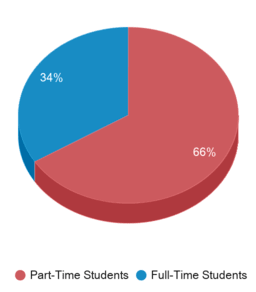
# Enrollment Undergraduate
435 students
246 students
# Full-Time Undergraduate Students
1,876 students
834 students
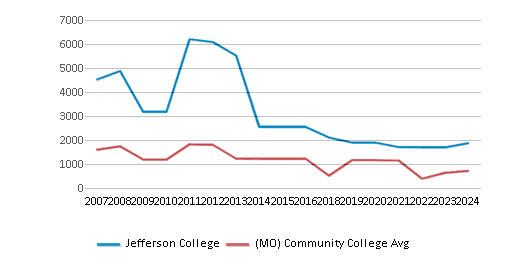
# Full-Time Graduate Students
n/a
11 students
# Part-Time Undergraduate Students
2,482 students
684 students
# Part-Time Graduate Students
n/a
9 students
Total Dormitory Capacity
204 students
200 students
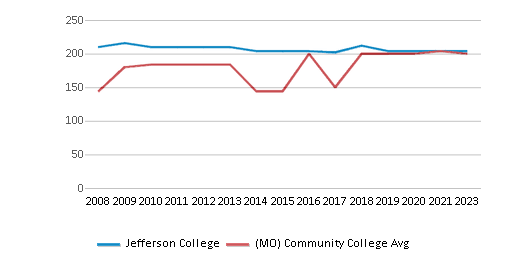
% American Indian/Alaskan
1%
n/a
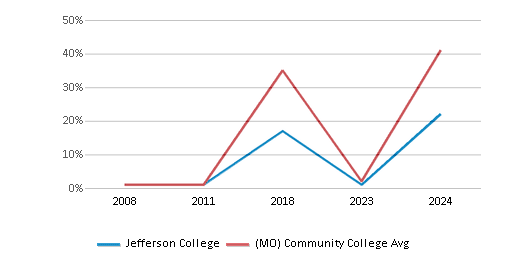
% Asian
1%
2%
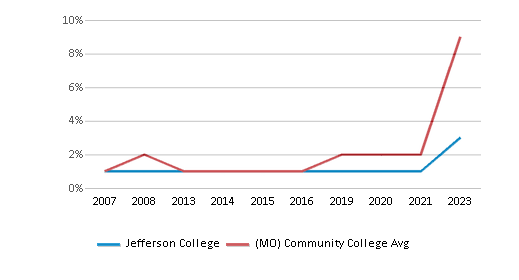
% Hispanic
4%
6%
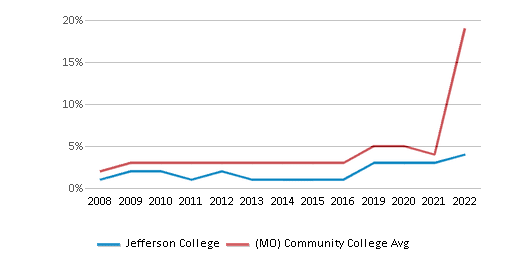
% Black
2%
10%
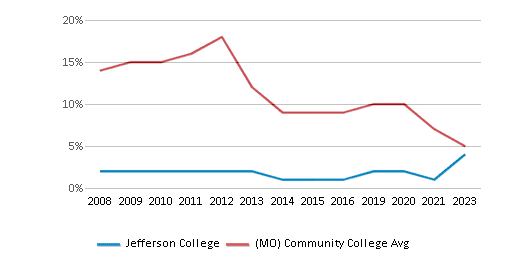
% White
88%
59%
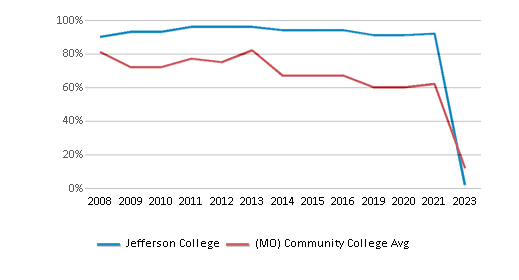
% Hawaiian
n/a
1%
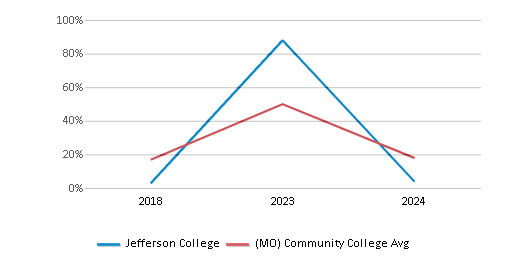
% Two or more races
2%
4%
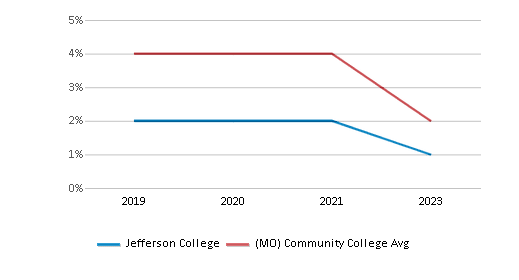
% Non Resident races
1%
1%
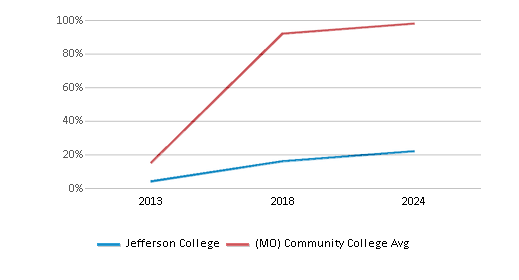
% Unknown races
2%
17%
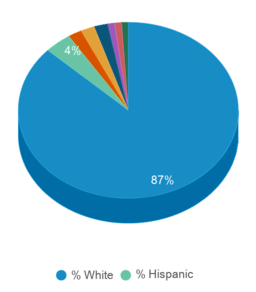
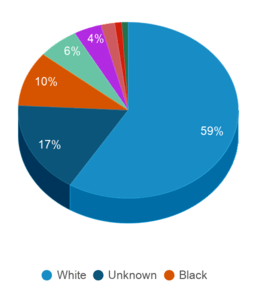
Diversity Score
0.22
0.61
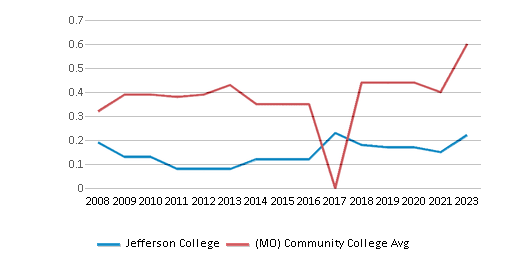
College Completion Rate (Students who graduate in less than 4 years)
0.3186%
0.433%
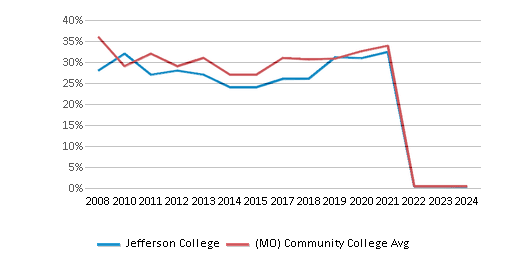
College Completion Rate (Students who graduate in 4 years or more than 4 years)
n/a
0.6154%
Average Graduate Earnings (10 Years)
$31,800
$30,900
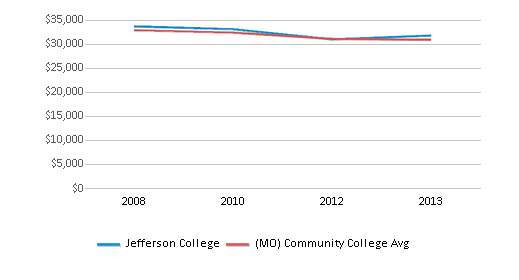
Tuition and Acceptance Rate
The public in-state tuition of $3,504 is less than the state average of $3,825. The in-state tuition has declined by 41% over four years.
The public out-state tuition of $4,656 is less than the state average of $5,579. The out-state tuition has declined by 38% over four years.
In-State Tuition Fees
$3,504
$3,825
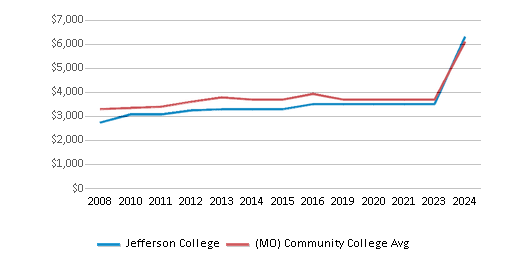
Out-State Tuition Fees
$4,656
$5,579
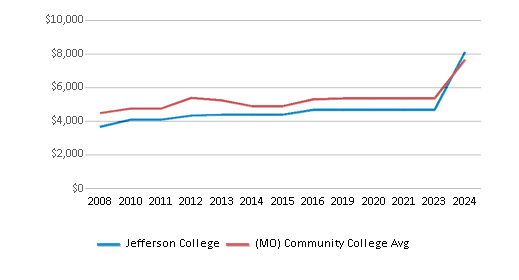
% Students Receiving Some Financial Aid
89%
91%
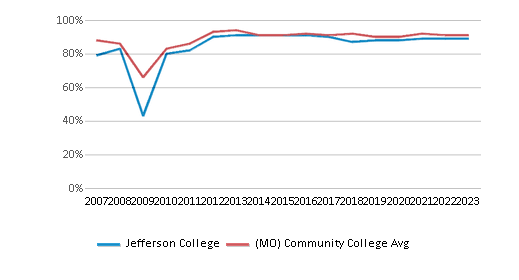
Median Debt for Graduates
$8,640
$10,500
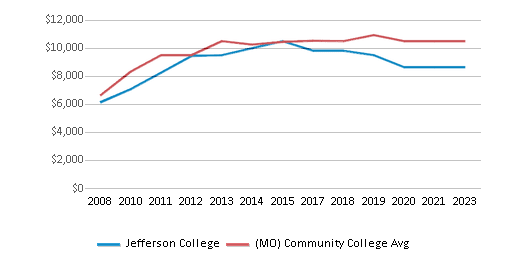
Median Debt for Dropouts
$5,500
$5,500
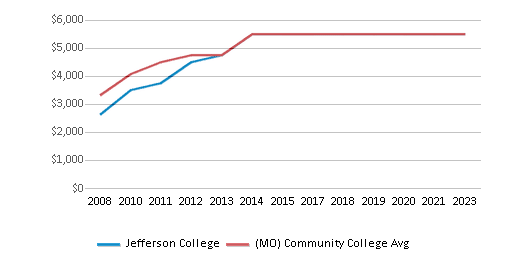
Acceptance Rate
n/a
94%
Source: 2024 (or latest year available) Integrated Postsecondary Education Data System (IPEDS)
School Notes
- Each year Jefferson College graduates transfer successfully to many four-year colleges and universities to complete their Bachelor's degree. By completing their general education requirements at Jefferson College, these students enter the four-year institution at Junior standing. It's a great way to save money while preparing yourself academically. Jefferson College enrolls more than 4000 students each year in college credit courses. More than 10,000 students take part in credit and Extended Learning offerings annually. Jefferson College is accredited by the Commission on Institutions of the North Central Association of Colleges and Schools. Jefferson College offers numerous programs in the "high tech" fields that are in high demand. These programs are designed to get you into the workforce in two years or less. Our Career & Technical Education graduates have experienced an average job placement rate of 97%, with starting salaries that rivaled or surpassed starting salaries of Bachelor degree graduates. Jefferson College sports teams compete annually at the national level. Four-year educational institutions recruit Jefferson College athletes because of their athletic and academic abilities. Women's athletic programs include volleyball and basketball. The men's athletic programs include baseball and tennis. Jefferson College is accredited by The Higher Learning Commission (formerly known as the Commission on Institutions of Higher Education of the North Central Association of Colleges and Schools).
Frequently Asked Questions
How much does Jefferson College cost?
Jefferson College's tuition is approximately $3,504 for In-State students and $4,656 for Out-State students.
What is Jefferson College's ranking?
Jefferson College ranks among the top 20% of community college in Missouri for: Least expensive tuition and Least debt for graduating students.
Recent Articles

Obtaining Your Bachelor's Degree at a Community College
Explore the evolving landscape of community colleges offering bachelor's degrees, addressing affordability, accessibility, and workforce needs.

A to Z of Community College Certificates and Courses
From business and healthcare to technology and skilled trades, the article showcases the breadth of options available to students seeking to enhance their knowledge, develop new skills, or pursue career advancement.

What is a Community College?
This comprehensive guide explains what a community college is, its history, and its role in higher education. It covers the types of programs offered, differences from four-year colleges, benefits of attending, and important considerations for prospective students, providing valuable insights for those exploring educational options.










